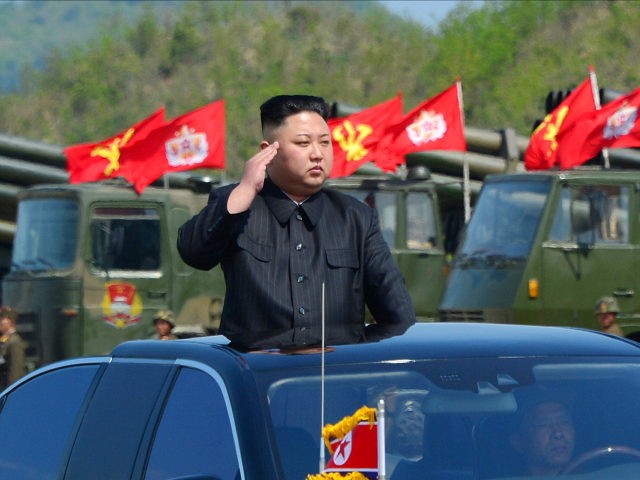WASHINGTON, DC — North Korean dictator Kim Jong-un is pursuing nuclear capabilities to coerce the reunification of the Korean Peninsula under his murderous communist regime, Adm. Harry Harris, the head of U.S. Pacific Command (PACOM), told lawmakers.
While discussing PACOM’s 2018 posture statement before the House Armed Services Committee on Wednesday, the commander told lawmakers:
I do think that there is a prevailing view that KJU [Kim Jong-un] is doing the things that he’s doing to safeguard his regime. I don’t ascribe to that view. I do think that he is after reunification under a single communist system. So he’s after what his grandfather failed to do and his father failed to do, and he’s on a path to achieve what he feels is his natural place and where North Korea’s natural outcome is a unified Korean Peninsula that’s subject to KJU and the communist regime there.
…
It puts him in a position to blackmail the South and other countries in the region and us. And I think that’s the overarching reason why he’s pursuing the nuclear capabilities that he has.
In the posture statement – a comprehensive summary of the combatant command’s role, missions, accomplishments, plans, and programs submitted to Congress each year – the admiral maintained that North Korea remains the “most immediate threat” against the United States stemming from the Asia-Pacific region.
Adm. Harris noted that the “level” of the North Korean “threat [had] increased significantly” since last year, adding that the rogue nation “could potentially” attach a nuclear warhead to an intercontinental-range ballistic missile (ICBM) that may be able to reach U.S. soil.
“The past year has seen rapid and comprehensive improvement in the DPRK’s [Democratic People’s Republic of Korea] ballistic missile and nuclear capabilities, despite broad international condemnation and the imposition of additional United Nations Security Council sanctions,” explained the admiral.
“I think we are self-limiting if we view North Korea’s nuclear ambitions as solely a means to safeguard his regime,” explained Harris. “I think we need to take that longer view and consider what he’s really after.”
Defying U.S. and U.N. sanctions, Kim has carried out multiple long-range missiles and nuclear tests in recent years.
“Recent testing and U.S. intelligence estimates show the regime is close to completing the missiles,” reports the Washington Examiner.
Since the Korean War entered a stalemate in 1953, the Korean Peninsula has been divided, with Kim’s family ruling the North and turning it into one of the most isolated and repressive regimes in the history of mankind.
Echoing Harris, Gen. Lori Robinson, the chief of U.S. Northern Command (NORTHCOM), told the Senate Armed Services Committee on Thursday, “We also recognize that North Korea represents the most immediate threat to our homeland, and, therefore, remains NORTHCOM’s highest priority.”
NORTHCOM’s mission is to protect the American homeland and oversee U.S. military activity in Mexico, Canada, and some parts of the Caribbean.
Gen. Robinson stressed that the U.S. military is able to protect Americans from a missile attack at the hands of North Korea.
“In the past year, Kim Jong Un has demonstrated several successful ICBM [intercontinental ballistic missile] tests,” she told lawmakers. “We continue to watch their developments closely and are prepared to defend the United States. And I want to assure this committee today that I am confident that I can defend the United States.”
“While I’m confident that we can defeat this threat today, it is critical that we continue to improve the ballistic missile defense enterprise, with emphasis on the development of improved sensor networks, combined with interceptor capability and capacity and reliability,” she continued.

COMMENTS
Please let us know if you're having issues with commenting.